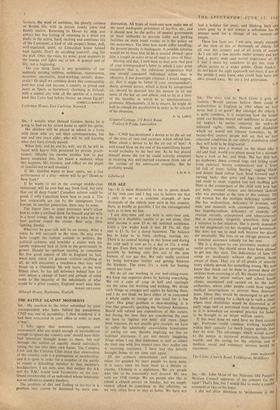Sia,--The stsiry told by Herb Greer is grim and realistic.
Would anyone . believe there could be malnutrition in England in 1963 where we hive never had it so good? But amongst the elderly it is quite common. It is surprising how the human • mind can become inured and indifferent to disgrace' ful neglect. In earlier centuries the well-to-de tolerated sights, smells, diseases and disabilities which we would not tolerate nowadays. In the , twenty-first century people will say that we have tolerated conditions in our elderly population which they will hold to be disgraceful.
When you pass a woman on the street who is old and frail, would you please pause for a moment. have a look at her, and think. She has thin hair. no eyebrows, dense corneal rings and failing' vi>ion from cataract; brown conjunctivae and a -lower lid full of tears; failing hearing; sagging Cheeks and deeply lined yellow face; head forward and curving back; thin arms and legs—bones brittle and ready to snap; crippled feet and shuffling gait. Here is the counterpart of the child with bow legt. pot belly, stunted stature and deformed skeleton who was prevalent at the turn of this century. The old woman has the multiple deficiency syndrome She has malnutrition. deficiency 'of proteins, vita' mint and minerals with consequent anaemia; she has hypothyroidism, deficiency of anabolic and ovarian steroids, osteoporosis and atherosclerosis. She is miserable, forgetful, querulous, dirty and a nuisance to her relatives. She is partly dependent on her neighbours for her shopping and housework. She does not see to read well because her glasses are unsuitable. She lives on an old-age pension and a national assistance subsidy for her rent. She is a disgrace to our preventive medical and social services. She should never have been allowed to get into this state. The deficiencies of later life creep on insidiously without the patient being aware of them. They are of all grades of severity; every elderly person has something wrong. 'We no'l know that much can be done to prevent these dis• abilities from occurring at all. We should have clinics similar to the infant welfare and school health clinics, maintained and carried on by the local authorities, where older people could have regulaf medical investigations to prevent these deteriora' tions. There they would be encouraged to get into the habit of coming for a check-up to such a clinic, where their disabilities would be discovered at an early stage and so prevented from developing; just as it is nowadays an accepted practice for babies to be brought to an infant welfare centre.
If this were done we need have no fixed retiring age. Everyone could continue working healthilY within their capacity for much longer periods than they do now. The advantages which would accrue to the nation in increased production, increased wealth, and the saving for the relatives and in medical, social and voluntary services would be enormous.
JOHN MAW-ASO
The Clinic, Church Road, Teddington, Middlesex


































 Previous page
Previous page